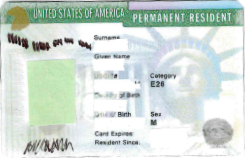U.S. CITIZEN SPONSORS TO BRING HIS RELATIVES TO THE UNITED STATES
GREEN CARD FOR YOUR FAMILY
If you are a citizen of the United States or lawful permanent resident (a.k.a “green card holder”), one of the advantages of your status is that you can sponsor your family in order to bring them to the U.S. If you are a US citizen, you may sponsor your husband/wife, child, your parents and your brothers or sisters. It doesn’t, however, include family members such as grandparents, aunts, uncles, cousins, nieces, and nephews. The Green Card holders on the other hand can only sponsor their spouse and unmarried children.

As a citizen, your spouse (husband or wife) and your unmarried minor children who is younger than age 21 are called “immediate relatives,” meaning they can apply for lawful permanent residence right away, with no annual limits and no waiting lists to delay their progress. You can either start the immigration process for your immediate relatives now by filing an initial visa petition for them or, if you already started it while you were a green card holder, have them continue the process at a faster pace.
The process for them often takes a year or more to complete as the visa petition still must go through a lot of application paperwork before these immediate relatives can get their green cards. The paperwork can’t be avoided but at least you’ll know that their cases are being processed faster than other family preference categories.
Your parents also fall into “immediate relatives,” and they can apply to immigrate to the United States right away, or as soon as you become age 21 or older. However, as mentioned above, even immediate relatives must get through the paperwork of immigration process, which approximately takes around a year to complete.
If you have unmarried children who are already older than 21 (this is visa preference category “2B”), your U.S. citizenship turns them into what are called “First preference (F1) – unmarried sons and daughters, 21 years of age and older, of U.S. citizens”. This is not as beneficial as being an immediate relative which means that they will subject to annual limits on the number of visas and will have to wait for an available visa before they can continue with their immigration process. However, they are fairly high on the priority list, and so will likely wait less time than people in other preference categories.
If you are U.S. citizen, you can also sponsor your married children as well as your brothers and sisters. However, these people will be considered your preference relatives (“Third preference (F3) – married sons and daughters of U.S. citizens”; and “Fourth preference (F4) – brothers and sisters of U.S. citizens (if the U.S. citizen is 21 years of age and older”), meaning that their green card processes will not be as fast as immediate relatives explained above. They’ll be put on a waiting list and subject to an annual limit on the number of visas that are given out. These may take many years to come. Both are fairly low on the priority list and are likely to wait many years before becoming eligible to immigrate to the United States.
GREEN CARD HOLDERS SPONSORING RELATIVES
On the other hand, if you are a lawful permanent resident (green card holder), you can still sponsor a spouse or child to come to the US to live. Spouses and children (unmarried and under 21 years of age) of lawful permanent residents fall into Second preference (F2A) and unmarried sons and daughters, 21 years of age and older, of lawful permanent residents fall into Second preference (F2B), meaning that they will face very long waiting times, due to limited annual limits. The length of the wait depends upon which family preference category is appropriate, as well as the country of origin.
If you want to sponsor a family member, you will need to file a petition with the U.S. Citizenship and Immigration Services (USCIS). You will also need to submit an Affidavit of Support for each family member you sponsor, to show that you are willing to financially support your family members so that they do not rely on the state for support.
We as Caglar Law Firm may assist you determine the best route available for your relatives and file their visa petitions.
Metin Caglar, Esq.



